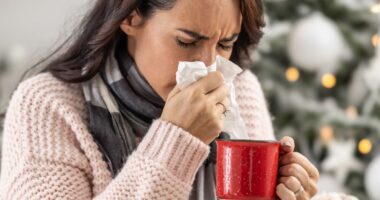Share this @internewscast.com
Protesters confronted Wes Streeting outside his office, accusing him of avoiding a meeting with them for over a year. The group, Just Treatment, advocates for equitable access to high-quality healthcare within the NHS and met with the health secretary in Ilford North yesterday. Streeting acknowledged their grievances, admitting they had been “victims” of the healthcare system, but expressed frustration with some aspects of their advocacy. He noted that he regularly meets with individuals who have experienced loss or harm due to NHS shortcomings.
The protesters also raised concerns about Streeting’s financial ties, claiming he had received over £220,000 from individuals associated with private healthcare. In response, Streeting, Labour’s health spokesperson, clarified, “I’ve never received donations from private healthcare companies, and any connections my donors have to private healthcare are minimal.”
Streeting pointed to Peter Hearn, a significant Labour donor, saying, “One of my donors, who is often mentioned, supports me because we share a similar working-class East End background and attended the same primary school.”
Highlighting funding disparities, Streeting remarked that left-leaning parties typically receive less financial support than their right-leaning counterparts, referencing Christopher Harborne’s recent £9 million contribution to Reform UK.
The SNP previously questioned the motivations behind NHS policies, asking whether they prioritize patient care or financial gain for investors.
Regarding emergency care, Streeting conceded that the current state of NHS services fails to provide “acceptable and timely care in every instance.”
He added that things are “moving in the right direction” but there is “loads more to do”.
For category one ambulance calls in England, the mean response time in October 2025 was eight minutes and one second, with 90% of all times at or below 14 minutes 18 seconds, according to the latest NHS data.
Both were quicker than October 2024, but the slowest since February 2025.
The average standard of seven minutes has not been met for four and a half years, but the 90th centile standard of 15 minutes has been met in every month of 2025 so far.
Mathew Hulbert, a Liberal Democrat commentator and former councillor whose mum died after an 11-hour wait for an ambulance three and a half years ago, said: “Streeting has ignored families like mine who have been so badly let down by the NHS. When your loved one is ill nothing matters more than a decent health service -but we have to fund it properly.
“We’re tens of billions short of what our European neighbours pay into their health services, while private healthcare companies are being allowed to profit from this crisis.
“It’s time Wes came out fighting for patients.
“What’s the good of a Labour government otherwise?”










